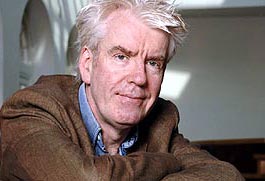Gerald Barry
Photos: Steffan Hill 2006 |
That it was. And really for all parties involved. Tuesday night brought the second of the current round of LA Philharmonic shows curated by the composer and pianist Thomas Adès to the Walt Disney Concert Hall which consisted entirely of a concert performance of Gerald Barry's opera
The Triumph of Beauty and Deceit in its US premiere.
It was a dazzling evening of music. 55 minutes of, in Steven Stucky's words, "relentless" music structured around a tale about the struggle over Beauty between two teams of ideals: on the one hand Pleasure and Deceit, on the other Truth and Time. Not so much characters as representations of ideas, the five roles are all sung by males, two countertenors (Pleasure and Truth), a tenor (Beauty), a baritone (Deceit), and a bass (Time). The vocal writing and libretto create an interesting gay subtext to the work as well. Although Barry points out that these are not really people as much as they are ideas, on some level the work can be read as a romantic struggle between different pairs of men. Given the valence of some of these particular issues in the gay male community (e.g.,the role of pleasure, the importance of youth and beauty) the piece can also be seen as a political commentary as well although I doubt it was the primary intent of the authors. This subtext is also interesting considering how Barry's later opera,
The Bitter Tears of Petra von Kant, raises these issues again when dealing with the subject matter of Fassbinder's film and its all female cast.
The original libretto by poet Meredith Oakes, who is also responsible for the similarly styled libretto of Adès'
The Tempest, consisted of rhyming couplets that were set in unusually stressed intonation patterns and were often sung at a rapid pace. The music itself is not lyrical or conventionally melodic, although as Stucky and Barry himself pointed out in a pre-concert talk, the music is actually nothing but melody - only multiple and unsynchronized lines being played simultaneously often in clusters of different instruments and singers throughout the piece. The frenzied effect created a real sense of struggle amongst the characters and highlighted the many ways these concepts overlap and yet in different ways do not. Even more stirring was the way in which the piece ends in a simple paired and mirrored line sung a capella by Beauty and Pleasure resolving the conflict of the piece both musically and dramatically.
The vocalists were all excellent and deserve mention - Andrew Watts, Stephen Wallace, Christopher Lemmings, Keith Phares, and Kevin Burdette. The small ensemble of the LA Phil new music group showed great skill and nerve as is their reputation with a difficult score including the evening's concertmaster,
Bing Wang, another of my favorite Philharmonic members.
The other triumph of the evening, though, goes to the LA Phil. Again LA produced a respectively huge crowd for this performance. One, in fact, that clearly took Adès somewhat by surprise as he came out on stage and commented (as Brett Dean did only a few weeks ago) on the size of the audience. Yes, Virginia there is an audience for new music. It's here in LA and it doesn't require a token Beethoven symphony or Brahms concerto to get people to buy tickets. Now here's the big question (again): who'll be first in the US to stage
Bitter Tears?
Santa Fe are you listening?







Follow Along
Brian
Los Angeles
Follow me on Twitter